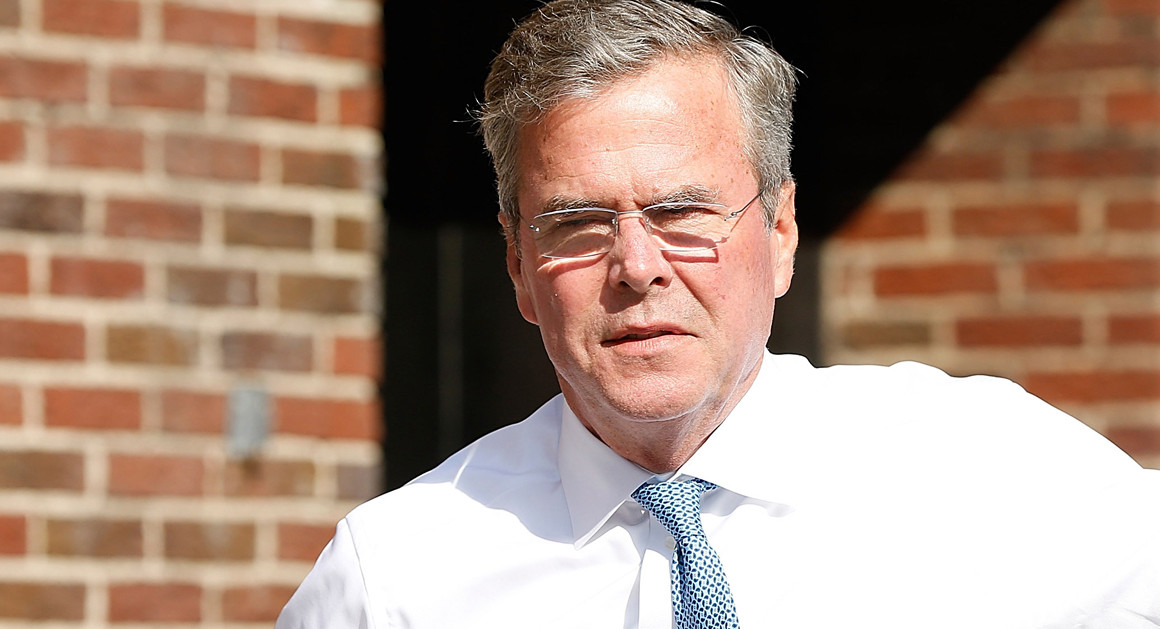
Jeb Bush’s campaign, wounded after another mediocre debate performance, is bracing for the possibility that revenue dries up in the coming weeks ahead.
It’s a striking turn for a campaign that had embarked on a “shock and awe” approach to fundraising and then delivered a record-breaking haul of $114 million of hard money and super PAC dollars during the first half of the year.
After Wednesday’s bruising in the third GOP debate, Bush spent much of the latter half of this week responding to media questions about whether his presidential bid is now “terminal” or “on life support.” The candidate didn’t do himself any favors with his seemingly pained delivery of “having lots of fun” when asked if he’s enjoying himself on the trail.
Top campaign officials, meanwhile, are seeking to reassure staff that now is not the time to panic. On Friday, campaign manager Danny Diaz led a staff conference call in which he acknowledged that Bush had a bad week, but urged employees to soldier on, one Bush aide said.
Staffers in Miami are reportedly frustrated after having relocated there only to be asked now to work for less money and accept reassignments to other states. There is a “broad sense of betrayal, disappointment and anger,” according to a source inside the campaign.
Even while attempting to calm internal jitters, the campaign is trying to be wide-eyed about the possibility that funding could even more dramatically slow down. Bush reported earlier this month that his campaign had raised $13.4 million in the third quarter, and went into October with just $10.3 million on hand – less than three of his rivals, including Sen. Marco Rubio.
The campaign is now looking for ways to cut costs, even beyond what was promised in a restructuring announced before Wednesday’s debate, according to a campaign aide. And one donor speaking to POLITICO suggested that top officials -- including Diaz, adviser Sally Bradshaw, and early state strategist David Kochel -- might be willing to take additional pay cuts as part of a new barebones operation. Already, Bush’s top campaign chiefs have taken $75,000 pay cuts each.
“They’re asking a lot of the staff, so there’s a feeling of: ‘Let’s lead by example,’” a Bush supporter said. “Everyone’s going to make sacrifices because they believe in Jeb Bush.”
Campaign officials, however, stressed that no decisions had been made – and not to expect any major moves until after the next debate, which is scheduled on Nov. 10.
Other campaigns are already positioning themselves to exploit Bush’s decline. John Kasich, who has been treading water, could see an opening among more moderate Republicans as Bush fades. And rival Marco Rubio is courting the establishment donors that originally flocked to the elder Floridian and one-time friend.
On Friday, New York billionaire Paul Singer threw his support behind Rubio and urged dozens of other donors to do the same. As first reported by The New York Times, Singer’s decision follows an aggressive courtship not only by Rubio but Bush as well.
Bush, on a conference call with donors, said he knew he needed to improve as a candidate. “I realize I need to get better,” the former Florida governor said Thursday, according to one person on the call.
So far, the most high-profile departure from Bush’s team has been that of Christine Ciccone, the campaign’s former chief operating officer who worked in a similar administrative position in George W. Bush’s White House.
Ciccone, despite being described by campaign officials as an office administrator who had no role in the political operation, was well-compensated, pulling in an annual salary of $144,000.
- Publish my comments...
- 0 Comments
